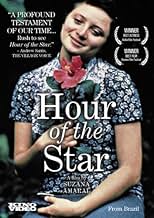VALUTAZIONE IMDb
7,4/10
1727
LA TUA VALUTAZIONE
Aggiungi una trama nella tua linguaThe tale of the naive Macabéa, a 19-year-old lonely and poor woman from the Northeast of Brazil who moves to São Paulo in hopes of a better future after losing the aunt who raised her.The tale of the naive Macabéa, a 19-year-old lonely and poor woman from the Northeast of Brazil who moves to São Paulo in hopes of a better future after losing the aunt who raised her.The tale of the naive Macabéa, a 19-year-old lonely and poor woman from the Northeast of Brazil who moves to São Paulo in hopes of a better future after losing the aunt who raised her.
- Regia
- Sceneggiatura
- Star
- Premi
- 11 vittorie e 1 candidatura in totale
Sonia Guedes
- Joana
- (as Sônia Guedes)
Dirce Militello
- Mãe de Glória
- (as Dirce Militelo)
Euricio Martins
- Guarda do Metrô
- (as Eurico Martins)
Lizete Negreiros
- Maria
- (as Lizette Negreiros)
Recensioni in evidenza
Hour of the Star (1985) is a straight forward look at life in poverty stricken Brazil. Away from the glitz and glamor of the popular traveler's paradise and away from the tourist traps. Life is hard and the outlook is very bleak for the poor working class of Brazil. But one young woman is determined to live life to the fullest. She dreams of a future that only exists in her mind. No matter what situations life dishes out, she remains oblivious to reality and remains in a fantasy world searching for a man who'll take her away from her life of poverty.
Brilliant film. I watched this one in college and I was amazed by the film-making and the strong storyline. I couldn't believe that people lived in such squalor (they make the ghettos look nice). People living on slave labor wages and doing everything they can to survive. I highly recommended this picture (if you can locate a copy).
Awesome film.
A
Brilliant film. I watched this one in college and I was amazed by the film-making and the strong storyline. I couldn't believe that people lived in such squalor (they make the ghettos look nice). People living on slave labor wages and doing everything they can to survive. I highly recommended this picture (if you can locate a copy).
Awesome film.
A
If you are in a bad mood or unquiet, don't try this one. There are several moments that you will think Macabea lives in a hell, and that she is too stupid to get out. But the movie is made to be analysed, and if you keep watching, you will fell it. Her relationship with Olimpico, and the antagonism of personalities, the perspective of Macabea about her life, opportunities and the future. Everything has a reason to be shown, every single word has a meaning. The movie was based on Clarice Lispector's best-seller "A Hora da Estrela" (The Star Time).
Unfortunately this is just good photography and decent acting. Nothing else you can see here... The dialogues are dull and the story takes you into a jorney to nowhere. It's just a waste of time.
This film was an excellent metaphor for the depravation so many northern Brazillians experience when they imigrate to the coast in search of work, love, opportunity, and excitement.
Macabea, the protagonist of the film, is an immigrant orphan from northern Brazil who comes to the city in search of economic prosperity. She lacks the education to find a descent job, the social skills to have friends or a boyfriend, and the etiquette in order to fit in in normal life.
She is portrayed as ugly, filthy, and disgusting. She lacks an understanding of proper hygiene, as shown several times throughout the movie when she does not wash her hands and, as a result, covers the papers she types in dirt and in a scene where she eats while urinating on a pot in the middle of the night.
She is a symbol of the depravation of so many northern and northeastern immigrants in Brazil.
The film is full of cleverly constructed imagery and symbolism. Depressing and sad, but genius.
Macabea, the protagonist of the film, is an immigrant orphan from northern Brazil who comes to the city in search of economic prosperity. She lacks the education to find a descent job, the social skills to have friends or a boyfriend, and the etiquette in order to fit in in normal life.
She is portrayed as ugly, filthy, and disgusting. She lacks an understanding of proper hygiene, as shown several times throughout the movie when she does not wash her hands and, as a result, covers the papers she types in dirt and in a scene where she eats while urinating on a pot in the middle of the night.
She is a symbol of the depravation of so many northern and northeastern immigrants in Brazil.
The film is full of cleverly constructed imagery and symbolism. Depressing and sad, but genius.
If you've ever read Lispector's text, Amaral's film is a must-see. You may be wondering how Amaral could possibly manage to capture Lispector's musings on the act of writing or questions regarding representation as they are presented through her narrator, Rodrigo. Pay close attention, and you'll find your answer. Although Rodrigo is absent from the film, he is symbolically present via Amaral's juxtaposition of Macabea's humble life, and the reality that is presented to her within an industrialized society. I personally believe that this is not a representation of the original text, but an appropriation of certain underlying themes within it. As you will see, Amaral manages to give us her own perspective and cultural critique of representation via the artistic medium of which she is a part. In this sense, the film stands alone, independent of the novella, with a few strong threads tying the two together. For anyone who is interested in the question of representation within the cultural industry, commodity fetishism, capitalism, feminism, etc., you need to watch this film, and then you need to watch it again.
Lo sapevi?
- QuizBrazil's submission to the 1987's Oscar as Best Foreign Film. Suzana Amaral was the first Brazilian female director submitted. The next female director submitted would be Anna Muylaert for È arrivata mia figlia! (2015).
- ConnessioniFeatured in São Paulo - Sinfonia e Cacofonia (1994)
- Colonne sonoreCada Vez Que Ela Sai
(Música Incidental)
Written by Thibes
Performed by Ivan Prado
I più visti
Accedi per valutare e creare un elenco di titoli salvati per ottenere consigli personalizzati
Dettagli
Contribuisci a questa pagina
Suggerisci una modifica o aggiungi i contenuti mancanti

Divario superiore
By what name was A Hora da Estrela (1985) officially released in India in English?
Rispondi























